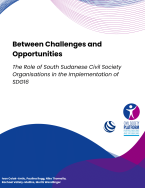
The Role of South Sudanese Civil Society Organisations in the Implementation of SDG16
Civil Society Organisations (CSOs) are key players in the achievement of Sustainable Development Goal 16 in South Sudan, with various components of the goal either implicitly or explicitly forming part of their agendas. As the world’s youngest state and a post-conflict society, South Sudan presents a challenging socio-political and logistical context for the work of CSOs. Although conditions for their operations have improved over time, veritable obstacles remain in place. As South Sudan’s Voluntary National Review approaches, it is critical to establish the primary difficulties faced by these organisations in mobilising civil society towards sustainable development, while identifying which strategies are in place to counter these challenges.This report addresses these issues, utilising the insights of local professionals to present a grounded and contextually specific series of recommendations on how CSOs can maximise their effectiveness in local and national communities.
The findings of this report indicate that the principal obstacles faced by CSOs in their contributions towards SDG 16 consist of the following:
- Ethnic tensions within South Sudan.
- Presence of armed rebel groups.
- State interference and bureaucratic barriers.
- Lack of human capital.
- Lack of funding.
In order to facilitate and expand the work of CSOs, this report presents a series of recommendations tailored to various stakeholders engaged in the peacebuilding process in South Sudan.

